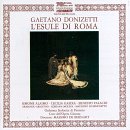| All Artists: Gaetano Donizetti, Massimo de Bernart, Cecilia Gasdia, Simone Alaimo, Orchestra Sinfonica di Piacenza, Coro dell'Opera Giocosa, Ernesto Palacio, Adriana Molina, Maurizio Di Benedetto Armando Ariostini Title: Donizetti - L'esule di Roma / Alaimo � Gasdia � Palacio � Ariostini � A. Molina � Di Benedetto - De Bernart Members Wishing: 0 Total Copies: 0 Label: Bongiovanni Original Release Date: 1/1/2006 Re-Release Date: 4/18/1995 Album Type: Import Genre: Classical Style: Opera & Classical Vocal Number of Discs: 2 SwapaCD Credits: 2 UPC: 750582040221 |
Search - Gaetano Donizetti, Massimo de Bernart, Cecilia Gasdia :: Donizetti - L'esule di Roma / Alaimo � Gasdia � Palacio � Ariostini � A. Molina � Di Benedetto - De Bernart
 | Gaetano Donizetti, Massimo de Bernart, Cecilia Gasdia Donizetti - L'esule di Roma / Alaimo � Gasdia � Palacio � Ariostini � A. Molina � Di Benedetto - De Bernart Genre: Classical
|
Larger Image |
CD DetailsSimilar CDs
|
CD ReviewsAn interesting, well performed Donizetti rarity Armindo | Greece | 07/26/2006 (4 out of 5 stars) "L'Esule di Roma is a quite interesting rare Donizetti opera and I'd welcome a revival nowadays. How about assembling Kwiecien, Filianoti or Florez and Netrebko or Devia and making a beautiful recording of this work? It has interesting, long scenes for the individuals but also some lovely ensemble scenes and a moving baritone/soprano (father/daughter) duet. This particular performance took place during the bel canto revival of the 80s and Bongiovanni quickly grasped the opportunity to record the event. I was very, very impressed by Palacio who interestingly enough was Florez's teacher. His popular student sounds very much like him something I hadn't noticed before, and I actually find Palacio's voice even more pleasing to the ear. When it comes to florid passages and high notes however Florez certainly is more skilled but Palacio's gentle phrasing and voice are wonderful. He avoids singing very high on this live recording but I hardly noticed. Alaimo has been around for years and this performance captures him in his prime. I've never been a fan of his voice but he sings very well here adding lots of vocal colours and lots of emotion in his singing. He has a long scene before the finale which he performs very well and stands out in his duet with Gasdia. She is another singer I'm not a fan of. Her tone is often lovely but sounds unsupported and weak. With Dessi and Devia and others around in the 80s I don't think she should have appeared on so many recordings. I'd describe her performance here as lovely in the long duet with Alaimo but unexciting elsewhere, especially in her big last scene, the only one the soprano gets in this opera. The sound is great so no technical hesitations. The audience sounds pleased and no problems with the maestro either so if you're looking to invest in this opera (invest considering the price!), this is a fine opera I really enjoyed despite my preferences about the vocals." Where's The Lion ? James S. Eisenberg | 04/27/2010 (4 out of 5 stars) "Donizetti's early L'ESULE DI ROMA is a delightful combination of the naive and the sophisticated. It is one of his most appealing scores. Based on the same literary sources as Shaw's ANDROCLES AND THE LION, it bypasses the tale of the lion and goes off on another more serious tangent. (A pity, Donizetti's musical language of the period would have worked very nicely with a semi-seria subplot !) The musical highlight is an eighteen minute scene and trio which closes the first act. Father's, daughter's and "proscribed" lover's emotions are admirably captured by the composer. The tenor and bass get two arias each (the second for the bass is a low voice mad scene-he is driven mad by guilt from having condemned the proscribed lover to death in the arena !), while the soprano doesn't get an extended solo until the very end. The first two sections of her final three part aria are wonderfully expressive while the third, a dizzying "happy ending" cabaletta is really the score's only weak moment. The live performance is very good without coming within hailing distance of perfection. Cecilia Gasdia is an uneven performer. Since her coming to the fore in the early 1980s as a last minute substitute for an ailing Montserrat Caballe in the title role of ANNA BOLENA, she was systematically pushed into roles just a little beyond her grasp. She takes the stage with a winningly spunky manner, but she can't quite wrap her voice around some of the really tricky coloratura passages, has the odd intonation problem and is sometimes unsupported. (In all fairness, she is wonderful in the quiet middle section of her final scene.) Simone Alaimo as the father (Muerna) and Ernesto Palacio as the lover (Settimo) are both in close to top form. There are some small imperfections for both singers, unavoidable in a live performance, but generally they are first rate. Massimo De Bernart keeps things moving along nicely, but there are some odd mis-tuned moments, especially in the strings. The sound recording is very clear and listenable. There are good notes, Italian text and an English translation. (Although some of the English is delightfully skewered !)" A true winner John Cragg | Delta(greater Vancouver), B.C Canada | 11/07/2008 (5 out of 5 stars) "This opera comes as a very pleasant surprise. So often forgotten Donizetti operas show good reason for being forgotten and when revived do not have outstanding performances. Neither is true here. The libretto, while not promising in brief synopsis, turns out ot be considerably richer than one would expect in a work described as a melodrama. Instead, it shows a great deal of subtlety in the development of characters, so that we are not presented with the cardboard cut-outs that so often inhabited bel canto opera. Donizetti rises to the occasion magnificently, with much music as inventive, expressive and subtle as any he wrote, and several hummable tunes thrown in for good measure! Furthermore, the production is first rate. First class singers in a well conducted performance with a good orchestra are all that one could want and that is provided here, especially as the recording is immediate and well focused. One just wishes that other operas of promise would be revived with as spendid a cast. In other words, this is a first-rate set well worth having and enjoying not just as a curiosity but as opera at its best. I am just astounded that after this 1986 success the opera has apparently resumed its most undeserved neglect among opera companies of any stature."
|

 Track Listings (15) - Disc #1
Track Listings (15) - Disc #1
